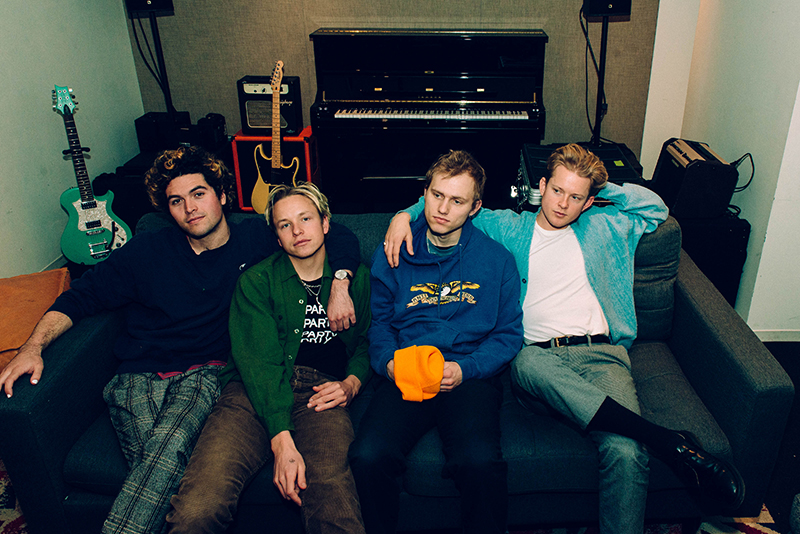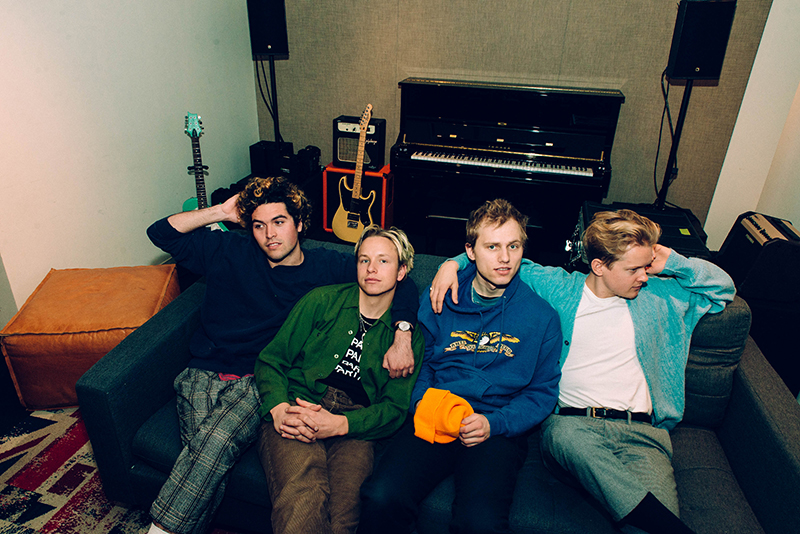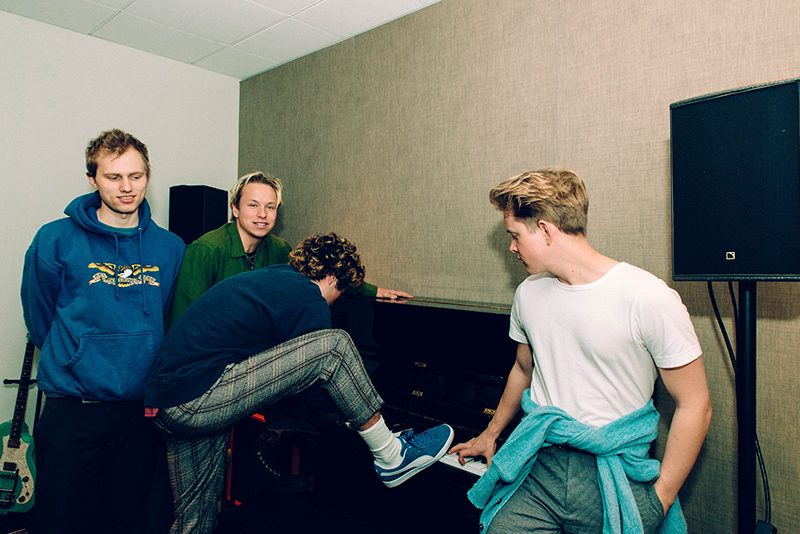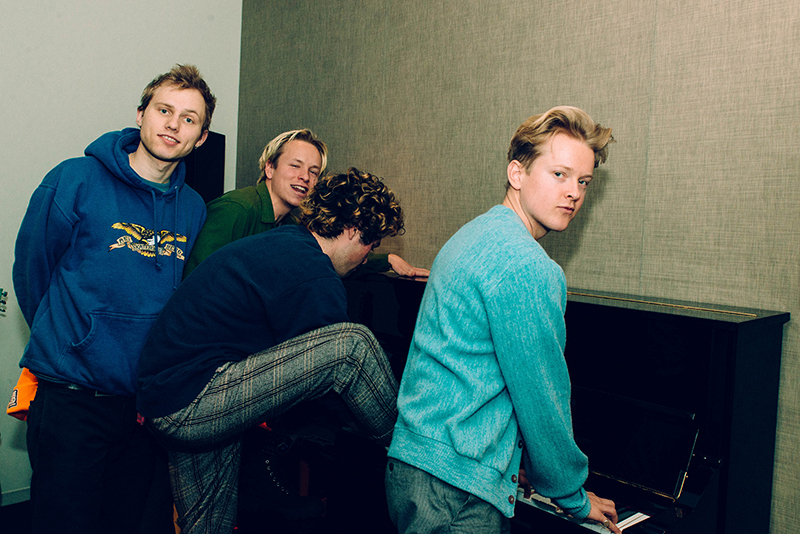
SWMRS have just released Berkeley’s On Fire when they visit New York for press and an in-store performance at Rough Trade. It’s a record full of “so much heart and soul… and so much creative energy trying to push the envelope of our industry”, and guitarist/vocalist Max Becker would like to be “inspiring, to go soul search.” Guitarist/vocalist Cole Becker can’t wait to “be that person’s best friend in that moment” as they sing along at a show.
Berkeley’s On Fire takes elements of the modern playlist mentality in its diversity, but it’s also a sequenced album. With everything at their fingertips, it’s natural that the record will span from fast-paced tracks with “really far-reaching, big ideas” like “Berkeley’s On Fire”, to slower, more sentimental songs with “very right-in-front-of-you ideas,” like “Bad Allergies.” The connecting thread is the focus on “keeping the soul of what we do original,” Max shares, and a drive to push their values and personalities.
The members of SWMRS grew up playing music together; in recent years, they’ve branched out into different interests in music and their personal lives. Watching Boy Better Know headline Reading and Leeds Festival in the UK inspired them to pursue a hip-hop direction with this album, though they have an appreciation for British music in general, citing BBK, Blur, and the Gorillaz as influences.
With the mainstream spotlight on hip-hop instead of rock, Cole notes that “people can really focus on expressing themselves and making something that’s true to form and an original thought,” adding that hip-hop is “the new millennial format for doing punk.” He and his bandmates are intrigued by the hip-hop writing process: using a computer as a notebook lets you immediately create a song from “the most deep-held thoughts in your brain”; the infrastructure around rock doesn’t always allow for the same freedom. Sampling old songs to make new music is also “a physical way to treat the past as the past and reinterpret it as something new,” rather than a weak or watered-down imitation of something old.
To catch listeners’ attention, you have to hook them in right away. SWMRS previously tried to make “these epic, long intros,” but realized they hadn’t spent enough time stripping away unnecessary pieces, so Max created a playlist of songs that spanned various genres and periods with one common theme: the first five seconds of each song “just hits something inside of you.” He compares putting together fragments from different eras to making a mood board: to create the melancholic, romantic, yet introspective vibe of “Bad Allergies”, they combined bass tones from the 70s, a modern vocal take, and a drum beat inspired by a Ringo Starr drum beat on a John Lennon solo record, but done with 808 drum machines and Fruity Loops.
Mueller says that SWMRS are “always” thinking about the live show while recording, though it’s no longer the band’s sole focus. Rather than stressing about how they’d perform “April In Houston” live, they focused on creating the best version of the song. Listening to a live recording will never be the same as seeing a band play live, “so how do you make a record that feels as urgent as a live show?” Cole asks. “Well, definitely not the traditional way.” They also thought about how different tempos would work in different spaces: when playing in front of large audiences while on tour with All Time Low, they found that “Miley” – a slow, but heavy, song – got everyone to dance, not just the faster cuts.
Identifying who their fans are (largely teenagers and young kids; often girls) is vital for SWMRS, whose goal for anyone listening is “to be their number one band that they care about most.” Cole explains that “when you put your music out in the world, you’re ultimately giving it to people;” listeners then attach their own meaning to it, so SWMRS strive to honor the fans have made their music a part of their own lives, because “everybody deserves their own soundtrack.” The band’s motto of “be the superhero version of yourself” has created a place at their shows for “the kids who are quiet at school, who are different at school, for the kids who are popular at school” to all come together. Many fans have stuck with SWMRS for years – the night before this interview, they met a fan that introduced the band to her boyfriend, saying she’d been waiting ten years to meet them.
On their Facebook page, SWMRS list “feminism” as an interest, but activism extends beyond making a social media post or making a statement on stage. Their touring party is mostly friends they grew up with, who happen to be male; acknowledging, and working to fix, this gender imbalance is a priority. On a recent tour, they partnered with non-profit organization Girls Behind The Rock Show to have a young woman in each city shadow the crew and help out as a “Roadie For The Day” and learn the ropes; they’re also working on setting up drum lessons for women in select cities. Mueller is clear that SWMRS are not trying to speak on women’s behalf, as they’ll never understand what that oppression feels like. Rather, they aim to “make it apparent that there’s a problem, make people aware and give this safe space and this platform for people who are oppressed and people who do suffer [from] discrimination to express themselves and feel safe and welcome.”
Further, SWMRS have created the SWMRS Fund: one dollar from each ticket sold will go to the fund, which will then be donated to different organizations. Armstrong mentions environmental protections as another cause close to their heart: on an individual level, they’re trying to be more conscientious by using reusable water bottles instead of plastic water bottles – but even these small changes can motivate fans to take action. There aren’t enough good role models out there, especially for young men, and the band wants to show the people at their shows how to be “upstanding, good people who support victims of abuse.”
Figuring all of this out – speaking up, being role models, and making music that sounds like themselves – is a journey of self-discovery. With the entire history of recorded music at our fingertips, Armstrong hopes that Berkeley’s On Fire is “something that you haven’t heard before, it’s something that isn’t in your record collection, and it’s something that you spend a lot of time on focusing on.” Moving forward in art and social issues is key, and he’d like to see other bands follow suit in creating music “that sounds like you,” instead of emulating what’s already been done



CONNECT WITH SWMRS:
